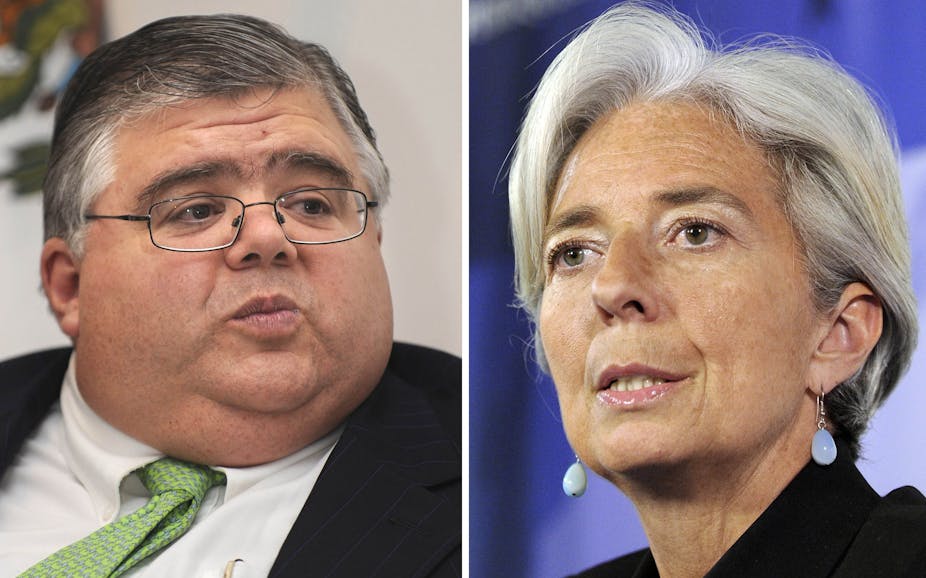The International Monetary Fund executive board will complete interviews of the two leading candidates to replace Dominique Strauss-Kahn this week, with the aim of picking a new managing director by June 30.
Mexican central bank chief Agustin Carstens fronted the board overnight, promising a consensus-building approach to running the institution.
But given the long-standing tradition of only Europeans being selected to head the IMF, it should come as little surprise that Carstens is likely to lose out French Foreign Minister Christine Lagarde.
Nonetheless, this changing of the guard has afforded the IMF the perfect opportunity to showcase its promised structural and governance reforms.
A decision by the G20 at the 2009 London Summit to inject US$1.1 trillion into a flailing World Bank and IMF was conditional on the IMF’s commitment to a number of internal reforms.
These aimed to afford greater participation to emerging-market and low-income member states in the running of the institution.
The appointment of a new chief on 30 June will stand as a very public demonstration of just how open and inclusive the fund has become.
The selection process has been bone of contention for many member states in what is meant to be a multi-lateral institution.
Historically, the managing director has been selected in a closed process by the executive board.
However, frustration with the inequitable representative and participatory structures at the IMF extends beyond the appointment process. In fact, these issues form part of a much older debate concerned with an apparent democracy deficit at the IMF.
Some argue that due to a combination of formal and informal power relations, only a handful of the world’s wealthiest member states can exert any real influence over the running of the IMF, which is comprised of 187 member states.
The train wreck of bad IMF loans during the late 1990s and growing discontent from emerging-market and low-income economies gave way to a serious legitimacy crisis, with developing states converging away from the institution.
Consequently, the IMF was seen by many as being “out of business” for most of last decade. With borrowing at an all time low in 2008, the fund resorted to selling off its gold reserves and offering incentives for 591 members of its own staff to quit.
The GFC was a blessing in disguise for the IMF. The events that transpired at the G20 London Summit have given the fund a second chance to get it right and embrace the true spirit of multilateralism.
This is why it is so important that the managing selection process reflects the positive changes the IMF claims to have implemented to engage all members.
Calls for a merit-based selection have been mounting from within and outside of the fund.
Upon his (scandal-free) resignation in 2007, former IMF chief Rodrigo de Rato announced a merit-based selection process for his replacement.
In 2009, the G20 London Summit Communiqué stated that “we agree that the heads and senior leadership of the international financial institutions should be appointed through an open, transparent, and merit-based selection process”.
Christine Lagarde has herself emphasised the importance of an open and transparent selection process, based primarily upon the merit of the candidates.
The executive board has implemented a series of changes suggesting that 2011 will mark the most transparent selection process in the fund’s history. These changes include: a published merit-based criteria, the ability of the executive directors and governors to nominate candidates (previously this was reserved for executive directors only), a published candidate shortlist, and, most importantly, the option of reaching a final decision by executive board vote rather than by executive board consensus exclusively.
However, I remain unconvinced that the fund is serious about real and meaningful reform. And I am not alone.
In an open letter to the IMF on 24 May this year, the BRIC bloc (Brazil, Russia, India, and China) and South Africa demanded the Executive Board abandon the “obsolete unwritten convention that requires that the head of the IMF be necessarily from Europe” and select the managing director “regardless of his or her nationality”.
On paper, the fund has committed to a transparent and merit-based appointment. But its commitment to this end has been proven to be merely token.
Lagarde is not an economist, but a corporate lawyer who was working in the United States until she was appointed to French President Nicolas Sarkozy’s cabinet.
Why is it that a lawyer is considered the clear front runner for the top job in a financial institution over individuals – such as Carstens – with extensive qualifications and experience in the area?
At heart, the IMF is an institution resistant to any change that would upset the current balance of power. Those holding the majority of influence do recognise the importance of appeasing the broader membership but have thus far paid only lip service to any multilateral-oriented reform.
The 30 June announcement cannot be predicted with absolute certainty, but one may be forgiven for holding reservations about the true transparency and merit upon which this decision will be based.

